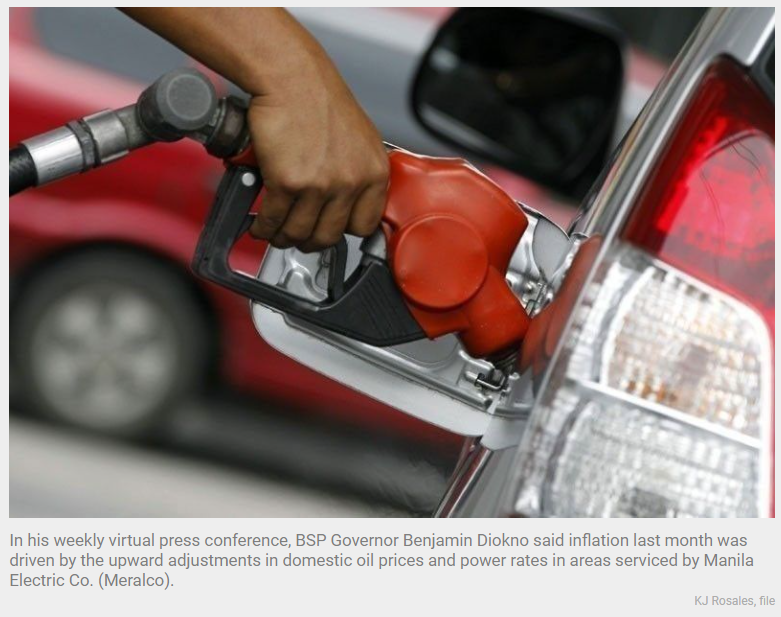Philippines: ‘Oil prices, power costs keep inflation past target in September’
MANILA, Philippines — The Bangko Sentral ng Pilipinas (BSP) said inflation likely settled at 4.8 to 5.6 percent in September, following its acceleration to a 32-month high of 4.9 percent in August.
In his weekly virtual press conference, BSP Governor Benjamin Diokno said inflation last month was driven by the upward adjustments in domestic oil prices and power rates in areas serviced by Manila Electric Co. (Meralco).
He also cited the increases in the suggested retail prices of basic necessities and prime commodities such as rice and fruits.
The upward pressures, the BSP chief explained, were partially offset by the decline in meat prices along with the slight appreciation of the peso against the dollar.
“Moving forward, the BSP will continue to monitor emerging price developments to help ensure that its primary mandate of price stability conducive to balanced and sustainable economic growth is achieved,” Diokno said.
Last week, the Monetary Board hiked its inflation forecasts to 4.4 percent for this year.
Inflation averaged 4.4 percent from January to August and continues to stay above the BSP’s target.
The central bank has maintained an accommodative stance, keeping interest rates at record-lows for seven straight rate-setting meetings since November last year.
Diokno reiterated that the country’s monetary policy stance would continue to be supportive of the domestic economy amid the uneven rate of recovery among countries across the globe.
“The prevailing manageable inflation outlook, together with the downside risks to domestic demand, continues to underpin the BSP’s overall stance of providing policy support to ensure a sustained economic recovery,” he said.
The relatively stronger rebound in advanced economies such as the US is expected to benefit the tentative recovery in emerging economies through increased global trade activity.
However, policy normalization by major central banks ahead of emerging-economy counterparts could also lead to a sharp tightening of global financial conditions.
For this reason, the BSP remains prepared for any potential volatility in capital flows and exchange rate movements that could arise from the normalization process.
The BSP chief noted that the Philippines remains in a robust position to withstand external headwinds on account of its sound macroeconomic fundamentals including a manageable inflation outlook, a prudent fiscal position, a sound banking system, ample external buffers, and a stable investment grade rating.
With external risks arising from shifts in monetary policy in major central banks particularly the US Federal Reserve, Diokno reiterated the BSP has a number of policy tools to address any potential volatility in capital flows to the country.
These include the flexible exchange rate system that remains the first line of defense in absorbing external macroeconomic shocks, the macroprudential measures to target specific imbalances in the financial system as well as the possible adjustment of monetary policy settings to respond to threats to the inflation outlook.
Source: https://www.philstar.com/business/2021/10/01/2130864/oil-prices-power-costs-keep-inflation-past-target-september


 Thailand
Thailand




